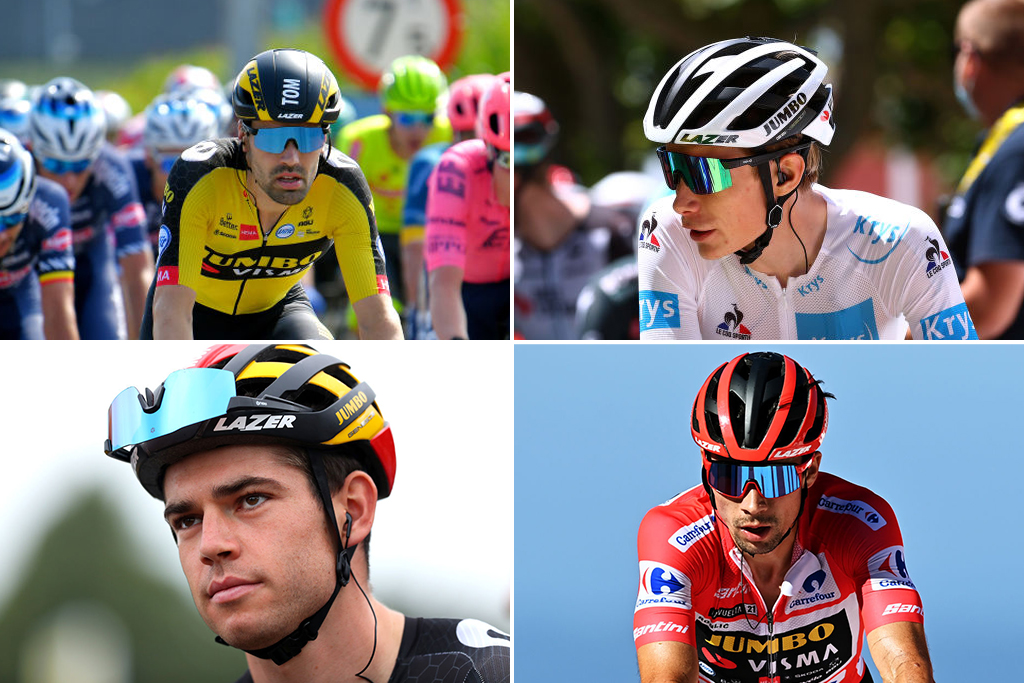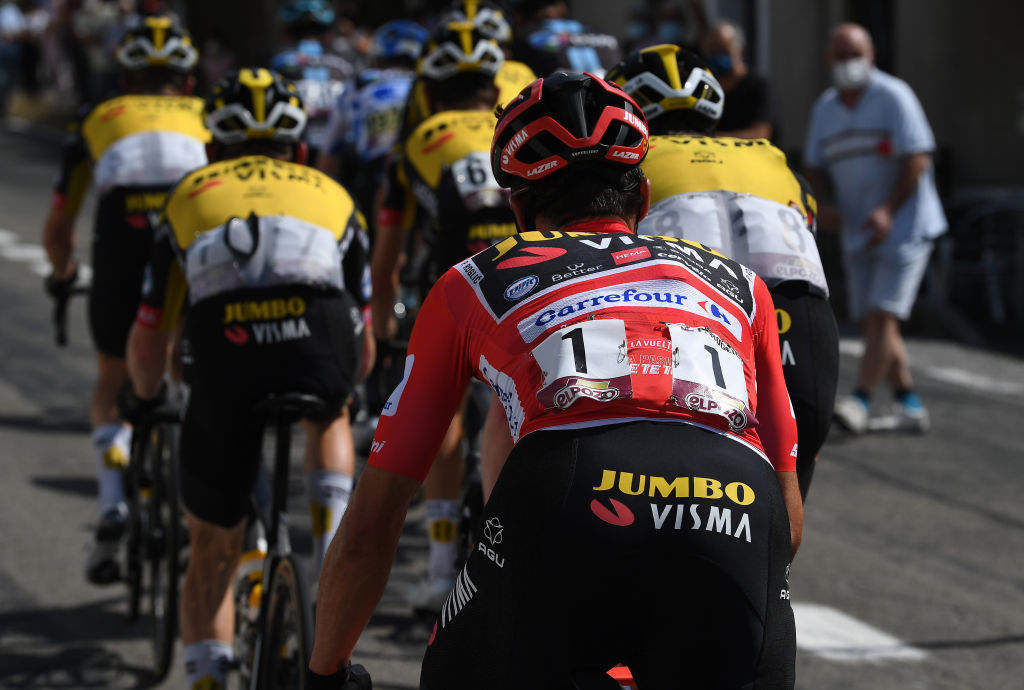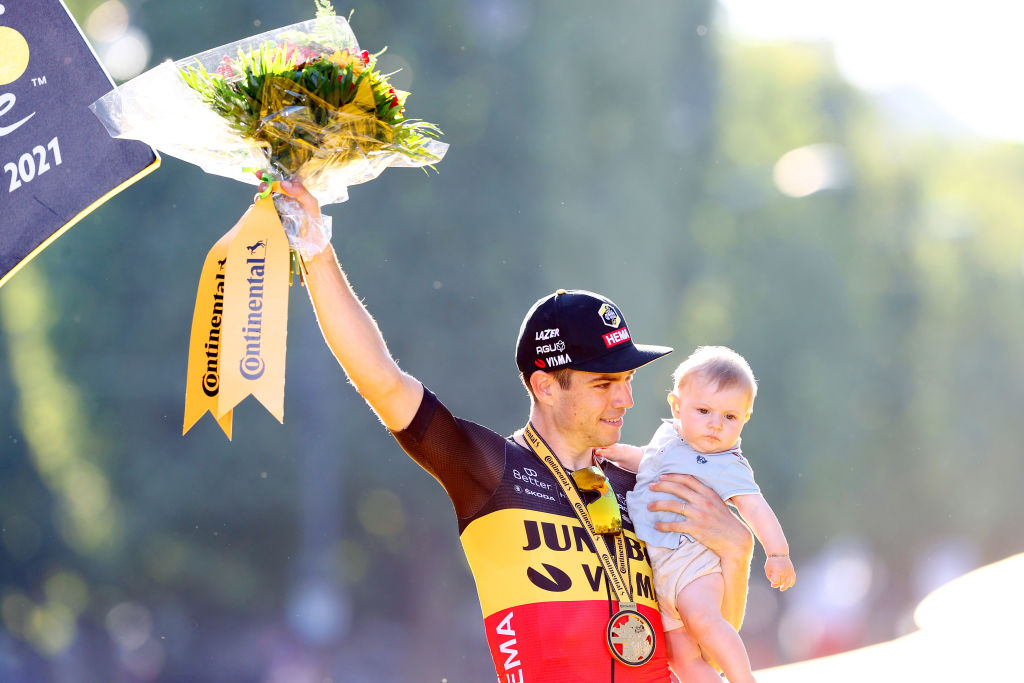2022 team preview: Jumbo-Visma
Roglic and Van Aert offer guarantees like few others

Who?
- Manager: Richard Plugge
- Squad size: 28
- Average age: 27.5
The Dutch squad of Jumbo-Visma has been through various guises since entering the peloton in 1984, sponsored by Kwantum and built around Jan Raas. The longest lasting iteration came as Rabobank from 1996 to 2012, ending when the bank pulled its backing in the wake of doping scandals.
Former press officer Richard Plugge was the man charged with leading the reboot, first under the Blanco banner and funded by a parachute payment from Rabobank, and later as Belkin and LottoNL. There were teething troubles during that transitional period, and the nadir came in 2015, when they collected just five wins and finished bottom of the WorldTour.
The rapid uptick in performance that followed coincided with the arrival of an unheralded late bloomer from Slovenia in 2016. Primož Roglič announced himself with a surprise victory in the Chianti time trial at that year’s Giro d’Italia, although Steven Kruijswijk’s long stint in the pink jersey – and eventual heartbreak on the Finestre – was at least as pivotal a moment in defining the team’s future ambitions.
Since then, Roglič, Kruijswijk and Jonas Vingegaard have all finished on the podium at the Tour, while the Slovenian has won the Vuelta a España three years in succession, and the depth of the supporting cast has strengthened accordingly. The arrival of Wout van Aert in 2019, meanwhile, opened another front, with Jumbo-Visma returning to the fore after years of under-performance in the Classics.
Although Plugge rarely tires of pointing out that his team’s budget is barely in the top 10 in the WorldTour, he can count on a roster of talent deep enough to ensure they are competitive across the calendar.
How did they fare in 2021?
- Wins: 43
- UCI world ranking: 3rd – 12,914.67 points

Jumbo-Visma dropped a couple of placings in the UCI rankings in 2021, but the beat still went on. Van Aert and Roglič were again leading the line as two of the peloton’s outstanding performers across the season while nine other riders weighed in with wins across the calendar.
Roglič’s year was plagued by ill fortune – crashes cost him Paris-Nice victory and forced an early abandon at the Tour – but he still ended the campaign as Olympic time trial champion and with a third Vuelta victory in as many appearances. For good measure, he also claimed Itzulia Basque Country and Milano-Torino.
Get The Leadout Newsletter
The latest race content, interviews, features, reviews and expert buying guides, direct to your inbox!
Van Aert, meanwhile, showcased his remarkable dexterity throughout the campaign, claiming two stage wins at Tirreno-Adriatico along with Gent-Wevelgem and Amstel Gold Race in the spring, and then illuminating the Tour with three more wins across varied terrains. For good measure, he claimed silver in the road race at the Tokyo Olympics and dominated the Tour of Britain, before finally showing faint signs of strain in the dying weeks of the campaign. Although he pushed Filippo Ganna all the way in the time trial at the Worlds, he was short of his best in the road race a week later and had to settle for 7th at the postponed Paris-Roubaix.
Elsewhere, Jonas Vingegaard hinted at his progression with a stage victory at the UAE Tour and the overall title at the Settimana Coppi e Bartali, and the Dane proceeded to offer confirmation with a most assured Tour debut, where he stepped into the role of leader following Roglič’s abandon and reached Paris in second overall.
Other youngsters to impress included Sepp Kuss, who won a stage at the Tour and placed 8th at the Vuelta while supporting Roglič, and Tobias Foss, who withstood the hardships of the Giro d’Italia’s final week impressively en route to 9th overall.
Tom Dumoulin’s sabbatical and subsequent reintegration to the team was one of the successes of 2021, and not because he landed an Olympic silver medal on his return. The Dutchman’s courage in pressing pause on his career, not to mention Jumbo-Visma’s immediate willingness to back that decision, offered a model for others at a time when competing at the top level appears to be demanding almost unsustainable levels of commitment.
Key riders
Primož Roglič: The Slovenian has had more practice than most at lifting himself off the canvas these past two years. In 2020, he responded to the trauma of losing the Tour on the final weekend by winning Liège-Bastogne-Liège and the Vuelta. In 2021, he bounced back from more Tour disappointment with an Olympic title and another Vuelta. He will hope for better fortune in 2022, when the Tour de France is, once again, the centrepiece of his year. But whatever the circumstances, he can be relied upon to win early and often across the calendar.
Wout van Aert: The 2021 Tour exemplified Van Aert, the world’s most versatile rider, as he won over Mont Ventoux, landed an individual time trial and then claimed the grandstand sprint on the Champs-Élysées. Relatively subdued showings in the final two weekends of the season raised concerns that he may be spreading himself too thinly, but his dominant cyclo-crosss return at the Superprestige in Boom last weekend suggested that it was but a temporary blip. Unfinished business at the Tour of Flanders and Paris-Roubaix will be the main focus early in 2022, but Van Aert has also signalled his intention to chase the green jersey at the Tour. His development as a week-long stage race contender will also be worth watching.

Tom Dumoulin: When Dumoulin revealed that he was taking a sabbatical in January of this year, citing burn-out, one wondered if the announcement was a prelude to an early retirement. He had, after all, endured injury and illness across the two proceeding seasons, as well as the stress of his departure from Sunweb to Jumbo-Visma. The time away, however, appeared to serve its purpose, with Dumoulin recalibrating his objectives and focusing primarily on time trialling in 2021. The break and successful return also looks to have whetted his appetite for a return to Grand Tours, though it remains to be seen if it will be as a leader or as a deluxe domestique.
Jonas Vingegaard: Vingegaard wasn’t the most heralded under-23 rider but when Jumbo-Visma signed him, they knew he had a greater margin for improvement than most. Up to six months before reaching the WorldTour, after all, he was still working part-time icing fish every morning on a factory floor in Hanstholm. After Vingegaard placed second overall in his debut Tour last July, it’s difficult to tell quite where his ceiling lies. He dealt calmly and assuredly with the pressures of leadership and has already outlined his desire to return to the 2022 Tour, which starts from his native Denmark. He will surely set out once again as Roglič’s understudy, but his progress will be worth following closely.
Strengths
It certainly helps having two of the three best riders in the peloton. Roglič and Van Aert offer guarantees of performance and results pretty much every time they pin on a race number and it’s difficult to envisage that changing in 2022. The Tour may be the white whale for Roglič, but his ability to harpoon stage race, time trial and hilltop victories across the entire campaign helps to keep Jumbo-Visma near the top of the WorldTour rankings. The same goes for Van Aert’s ability to perform on all terrains and the Belgian also doubles as a most deluxe climbing domestique at the Tour.
Indeed, Jumbo-Visma’s cohesion and apparent internal harmony is another obvious strength. In the 2020 Tour, Dumoulin and Kruijswijk ostensibly set out as part of a leadership trident with Roglič, but neither man had any qualms about sacrificing his chances for the Slovenian. In the 2021 Tour, meanwhile, the team successfully recalibrated on the hoof following Roglič’s early abandon in a way that would have proved beyond most squads. There are few signs of that internal harmony being disrupted in 2022, even if riders like Kuss and Vingegaard will surely be nurturing ambitions of their own.
Weaknesses
For all their collective might, Jumbo-Visma have been guilty of a certain tactical rigidity in the past, as if riding according to a set, risk-averse playbook. The 2020 Tour was a case in point, where they dominated the race for three weeks but repeatedly failed to hammer home Roglič’s advantage in the overall standings. Mercifully, it appears that the lesson has since been learned. See last September’s Vuelta, where Roglič took every opportunity to strike when the road climbed and then backed himself to follow Egan Bernal’s do-or-die attack on stage 17 before dropping him at Lagos de Covadonga.
Another relative weakness has seemingly been addressed in the transfer market, with Christophe Laporte and Tiesj Benoot added to Van Aert’s supporting cast in the Classics. Rohan Dennis, meanwhile, has the potential to help offset the losses of Tony Martin and George Bennett, particularly if he can replicate his 2020 Giro showing.
The team was, of course, heavily reliant on Van Aert and Roglič for wins in 2021, with that pair accounting for more than half of their wins. It remains to be seen if Dylan Groenewegen can pick up some of the slack in 2022. The Dutchman returned to action at the Giro after his suspension but even though he notched up three wins later in the year, he still appeared some way short of his former self.
Verdict
Expect more of the same in 2022, particularly from the two main men. Van Aert and Roglič will undoubtedly keep on producing feats of strength and amassing victories throughout the year. Much of the season will hinge, of course, on how they solve a problem like Tadej Pogačar at the Tour de France. If Roglič, backed by Dumoulin, Vingegaard, Kuss et al can’t do it, then surely nobody can.
Elsewhere, the second act of Dumoulin’s career could be one of the stories of the year. Between injury, illness and burn-out, he hasn’t raced a full season since 2018. He will hope for a clear run in 2022 and with that, anything is possible.

Barry Ryan was Head of Features at Cyclingnews. He has covered professional cycling since 2010, reporting from the Tour de France, Giro d’Italia and events from Argentina to Japan. His writing has appeared in The Independent, Procycling and Cycling Plus. He is the author of The Ascent: Sean Kelly, Stephen Roche and the Rise of Irish Cycling’s Golden Generation, published by Gill Books.